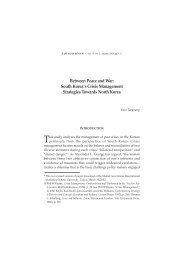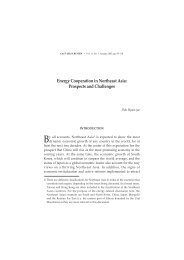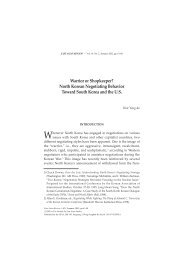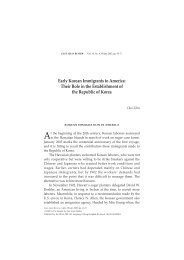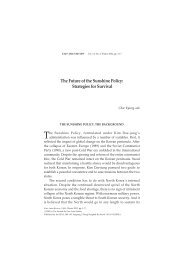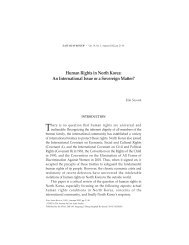Sino-Korean Relations since 1992 - the Institute for East Asian Studies
Sino-Korean Relations since 1992 - the Institute for East Asian Studies
Sino-Korean Relations since 1992 - the Institute for East Asian Studies
Create successful ePaper yourself
Turn your PDF publications into a flip-book with our unique Google optimized e-Paper software.
10 EAST ASIAN REVIEW SPRING 2002<br />
<strong>Korean</strong> peninsula, such a policy would only have a negative effect on<br />
<strong>the</strong> <strong>Korean</strong> peninsula.<br />
The worst possible scenario <strong>for</strong> <strong>the</strong> <strong>Korean</strong> peninsula would be<br />
<strong>for</strong> China-U.S. relations to turn confrontational, and <strong>for</strong> <strong>the</strong>re to be<br />
setbacks in U.S.-North Korea relations. In order to prevent this from<br />
happening, South Korea and China need to work more closely<br />
through dialogue and cooperation.<br />
It is likely that <strong>the</strong> U.S. and China will have a joint interest in <strong>the</strong><br />
prevention of war on <strong>the</strong> <strong>Korean</strong> peninsula as well as <strong>for</strong><br />
denuclearization. The possible differences in approach and methods,<br />
however, will cause conflict in China-U.S. relations. In particular, if<br />
<strong>the</strong> Bush administration should push implementation of <strong>the</strong><br />
principle of reciprocity in resolving <strong>the</strong> <strong>Korean</strong> peninsula question, it<br />
would conflict with China’s policy that places priority on creating<br />
conditions that would enable North Korea to come out of isolation<br />
and pursue re<strong>for</strong>m.<br />
On <strong>the</strong> contrary, if China and <strong>the</strong> U.S. could come toge<strong>the</strong>r <strong>for</strong><br />
<strong>the</strong> mutual goal of bringing peace and stability to <strong>the</strong> <strong>Korean</strong><br />
peninsula through close cooperation and dialogue, <strong>the</strong> principle of<br />
reciprocity emphasized by <strong>the</strong> U.S. government could work<br />
positively to change North Korea’s attitude, and even its policy on<br />
pending issues such as <strong>the</strong> issue of weapons of mass destruction.<br />
However, without <strong>the</strong> precondition of mutual cooperation between<br />
China and <strong>the</strong> U.S., emphasis placed by Washington on <strong>the</strong> principle<br />
of reciprocity could only work to heighten conflict and confrontation<br />
between <strong>the</strong> two countries on <strong>the</strong> <strong>Korean</strong> peninsula question.<br />
On <strong>the</strong> issue of <strong>the</strong> <strong>Korean</strong> peninsula, unlike that of Taiwan,<br />
which caused a rift in <strong>the</strong> U.S.-China relations, <strong>the</strong> interests of <strong>the</strong><br />
two countries have converged. The U.S. and China have a history of<br />
maintaining a cooperative relationship whenever <strong>the</strong>re has been<br />
tension on <strong>the</strong> <strong>Korean</strong> peninsula, such as <strong>the</strong> North Korea nuclear<br />
issue of 1994 and <strong>the</strong> long-range missiles issue of 1999. Based on this<br />
fact, both South Korea and China should concentrate on diplomatic<br />
ef<strong>for</strong>ts, so that <strong>for</strong> <strong>the</strong> U.S. and China can maintain and develop a



